April 22, 2016 at 10:40 am
The knowledge that the personalities of the two sexes are socially produced is congenial to every programme that looks forward to a planned order of society. It is a two-edged sword that can be used to hew a more flexible, more varied society than the human race has ever built, or merely to cut a narrow path down which one sex or both sexes will be forced to march, regimented, looking neither to the right nor to the left.
From p.310, in the conclusion to Margaret Mead's Sex and Temperament in Three Primitive Societies (1935)
By zakbos
|
Posted in Analects
|
Tagged Analects, anthropology, CC204, gender, sex, sociology
|
April 22, 2016 at 10:18 am
'Like' and 'like' and 'like' -- but what is the thing that lies beneath the semblance of the thing? now that lightning has gashed the tree and the flowering branch has fallen and Percival, by his death, has made me this gift, let me see the thing. There is a square; there is an oblong. The players take the square and place it upon the oblong. They place it very accurately; they make a perfect dwelling-place. Very little is left outside. The structure is now visible; what is inchoate is here stated; we are not so various or so mean; we have made oblongs and stood them upon squares. This is our triumph; this is our consolation.
This lyrical passage represents the thoughts of the character Rhoda, expressing her desire to directly perceive "music", without having to mediate her experience through language or thought. From The Waves by Virginia Woolf (1931).
By zakbos
|
Posted in Analects
|
Tagged Analects, Humanities, music, thought, Woolf
|
April 14, 2016 at 9:00 am
Dante'sDivine Comedy is one of CC 102's most memorable reads towards the end of the semester. It follows a similar epic poetry format seen inThe OdysseyorThe Aeneid, but with a twist. The famous Italian poet creates his own world through his 14,000 line epic separated into three books. He brings in characters we might recognize and also completely makes up stories. In 1265, nothing like this had ever been done before and with the beautiful Tuscan rhyme, it should not be easily forgotten today despite its difficult reading.

Dante Alighieri was an Italian poet from Tuscany. He was most notable for his political strife and exile as well as his love for Beatrice which we meet in The Divine Comedy.
The Inferno is probably the most read book of The Divine Comedy and famous for giving the reader a glimpse of the souls in Hell. Something about demons ripping at bodies with grappling hooks, and sinners eating each other is entertaining. However, many people, especially in the United States, chose to read only the first book and normally it is for academic purposes. The poor English translation and many confusing allusions prove difficult to get through, but we should not give up. The best way to accept the challenge is to:
Start by treating The Divine Comedy not as a book, with a coherent, beginning, middle, and end, but rather as a collection of poetry that you can dip into wherever you like. A collection of 100 poems to be exact, one for each canto, some more sublime than others. Breaking the poem down to its parts, getting to know the characters one or two at a time, learning the themes and language of these individual elements, can give you the traction to begin enjoying Dante and eventually take on his whole poem.
The reader takes a literary journey just as Dante journeys through Heaven and Hell. One might ask why bother trying if it takes so long, but by reading the text closely, many of Dante's insights are relevant today. No matter how many times it is read, something new can always be found woven in between the strange verses.
By CAS Core Curriculum
|
Posted in Academics, Core Authors, Great Books, Great Ideas
|
April 8, 2016 at 10:30 am
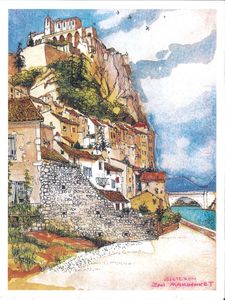
We are delighted to hear from Core alum Ryne Hager, who sent us a lovely (albeit brief) postcard from Sisteron in southeastern France. Here, he takes a page out of Rene Magritte's book.

Ceci n'est pa une post card.
* Core loves postcards. Whether you're at home or abroad now, we'd love to get one from you. Our address is easy: Core Curriculum, Boston University, Boston MA 02215.
By cdossett
|
Posted in Postcards
|
Tagged postcards
|
March 28, 2016 at 9:45 am
Are you #TeamDido or #TeamAeneas? Here at the office, we're split on the question of who to root for.
Prof. David Green -- an ardent supporter of Team Aeneas -- sympathizes with Dido's plight, but recognizes the importance of duty over impious furor. However! Cat Dossett (CAS '18) thinks that Dido doesn't need Prof. Green's sympathy. She wishes instead that Aeneas had drowned in Juno's fury.
Rallying to Cat's argument, the ever-dramatic Zak Bos (GRS '12) says he would have liked to see Aeneas pull his seduce-and-abandon trick on Medea...
The controversy is heated! While you think about where your own allegiance lies, take a gander at the website of the LA County Museum of Art, where you can find some excellent art images of Aeneas and Dido.
The first we'll look at is by Rutilio Manetti (1571-1639):
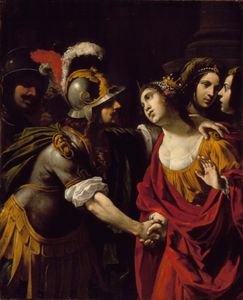
In his depiction of "Dido and Aeneas", Manetti places a spotlight on the lovers, highlighting the two's passionate expressions. They have eyes only for each other as the background is blanketed in shadow. Hands and eyes, locked in passion… You get the idea.
Compare Maetti's piece to these two paintings by Jean-Bernard Restout (1732-1797), "Aeneas and Dido Fleeing the Storm" and "The Departure of Dido and Aeneas for the Hunt":
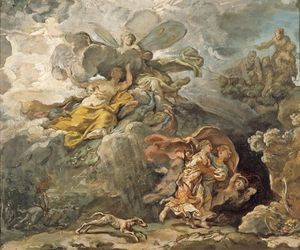
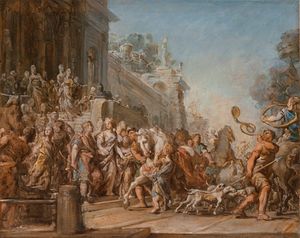
Restout doesn't focus on just the lovers. He's got lots of angels and horses and puppy-dogs and other such figures, makin' a lotta ruckus as Aeneas and Dido try to get on with their lovin'. Looks like their relationship was more complicated than we thought...
By zakbos
|
Posted in Art
|
Tagged Art, art history, Dido, posts by Cat Dossett, posts by Radhika Akhil, The Aeneid
|
March 21, 2016 at 1:35 pm

When Marco Rubio declared "We need more welders and less philosophers," he was greeted with quite the bit of applause. This push for vocational work (shall we call it a populist appeal?) has become a central thread in the public conversation of this election season; this is likely motivated by continuing concerns about economic recovery and the employability of recent graduates. But is Rubio right in what he says?
According to an article in Quartz brought to our attention by Core alumna Rheanne Wirkkala, no, he may not be right. The article (aptly if not succinctly titled "Teaching kids philosophy makes them smarter in math and English") mounts a defense of the liberal arts. Rheanne says of the article:
Everyone loves STEM which is also super important as we develop new and better technologies to solve big and difficult problems, but we cannot discount the incredible importance of critical thinking skills."
Indeed, these skills seem to be very important. According to the article:
Kids who took the [philosophy] course increased math and reading scores by the equivalent of two extra months of teaching, even though the course was not designed to improve literacy or numeracy...
Note that the philosophy course was not even 'designed' to improve the students' abilities in those areas. The philosophy class in which the children participated seems to have reached beyond the scope of its content.
Further down in the article: "The beneficial effects of philosophy lasted for two years, with the intervention group continuing to outperform the control group long after the classes had finished." Now, two years, one may argue, is not the longest time. However, considering that these students participated in only the single class, the question remains as to how the students would have done (compared to the ones who did not take the class) had the class continued. The class is also not a mere history class:
SAPERE's program does not focus on reading the texts of Plato and Kant, but rather stories, poems, or film clips that prompt discussions about philosophical issues. The goal is to help children reason, formulate and ask questions, engage in constructive conversation, and develop arguments.
Are these not qualities desired in vocational workers? It seems, then, that Rubio's declaration is incomplete; in fact, philosophy would make for better welders.
While fences may make good neighbors, it appears that philosophy makes good workers.
Header graphic source here. See also:
By zakbos
|
Posted in Academics, Curriculum, Great Questions, In the News, Other Publications, Science, Uncategorized
|
Tagged Humanities, posts by Priest Gooding, STEM
|
March 16, 2016 at 12:16 pm
Since the 1960s, anaristocratic, Italian familyhas kept hundredsof ancient Greek and Roman statues hiddenfrom the public eye.After many failed attempts in opening a private museum, the Torlonia family finally started negotiations with the Italian government. Now about 60-90 pieces will start traveling the worldin places such as the rest of Europe and America.
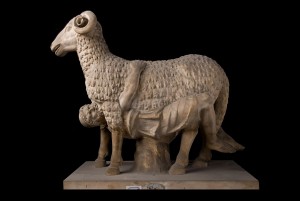
This statue of Odysseus fleeing the Cyclops' cave is included in the marvelous collection.
The familyowns around 2,000-3,000 pieces all housed in their many palaces. Giovanni Torlonia started the collection in 1810 when pieces were dug up onhisestates including the area around the modern day Leonardo da Vinci airport. Art historian Salvatore Settis is amazed by the collection and sees the importance of opening it to the public:
I think that even in such a rich context as Rome, the Torlonia collection you could think of it as a very important museum of a minor European capital. Many European countries dont have such a large collection of antiquities in the main museum of their capital, this gives you an idea.
Should this collection have one home in a museum in Rome after its tour or continuously travel the world as the Torlonia familywants to do? There are so many priceless statues that represent aninnovativetime periodin artand not even all of them will be displayed. The ones available should definitely be on your bucket list of things to seein 2017.
By CAS Core Curriculum
|
Posted in Academics, Activities, Art, In the News
|
March 14, 2016 at 2:42 pm
Imagine Julius Caesar running a modern day business class. Despite the ridiculous punishments imposed on students who might not have used the right font on their essays, we have to believe: he would probably come up with some GREAT leadership initiatives. He ruled a mighty state! So it's not crazy to think that students nowadays would be able to look at how he maintained his empire and find lessons there for running a contemporary business.
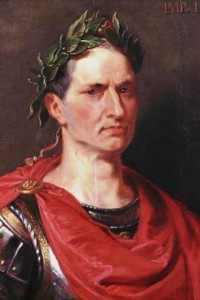
Julius Caesar: one of the most famous figures of Roman history, and also a business role model.
According to the Harvard Gazette,business school faculty members Emma Dench and Frances Frei joined together to create a new elective class called All Roads Lead to Rome: Leadership Lessons from Antiquity.
In this course, students read literature from such sources as Julius Caesar, Tacitus, and Plutarch. Through these readings, important ideas such as success, loyalty, and power make the students question business ethics today. Denuch admires these past Roman leaders, explaining:
The Romans grappled so actively with a very central issue of leadership: How much is a leader for themselves especially as a monarch or how much are they for the people as a whole, or part of the people as a whole?
So what is considered leadership today as a head of a company? Maybe a business leader shouldn't manifest the cruel dictatorship of a Roman official, but should demonstrate the ambition of one. It is up to students to decide where these ideas from the syllabus fit into their business education. Only after they've worked out the chains of relevance between the ancient sources and the contemporary business world will they be able to make sure of these lessons in modern Wall Street.
Hat-tip to alumna Erin McDonagh for bringing this article to our attention.
By CAS Core Curriculum
|
Posted in Academics, Core Authors, Great Books, Great Ideas, In the News
|
Tagged posts by Kassandra Round
|










